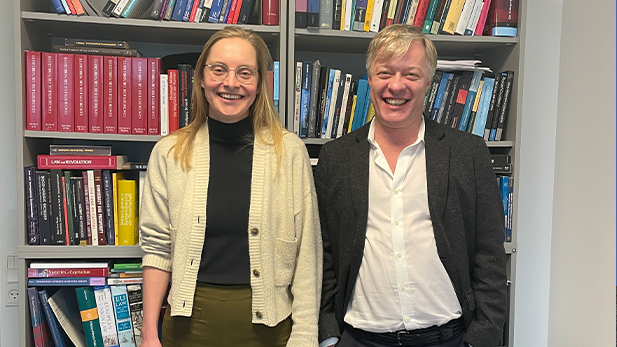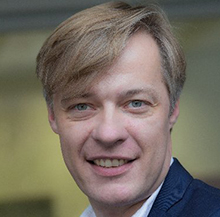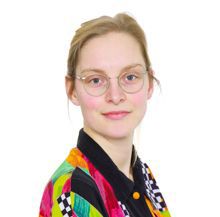Danish Elite Research Initiative honours CBS researchers

”One perspective is never enough to explain the extremely complex reality we are all part of. There always has to be at least one economic, legal, cultural and social dimension in rebuilding our society”, says Poul Fritz Kjær.
Professor of Sociology of Law and Political Economy at the Department of Business Humanities and Law at CBS. Kjær studies how legal remedies can be used to solve economic problems, and one of his fundamental ideas is to look at the past to understand – and improve – the present and the future.
”I believe that more historical and sociological awareness of the origin of our ideas will prove very useful in a legal context. For instance, I see a lot of goodwill when it comes to making new regulations and launching new initiatives to help less developed countries; however, at the same time there is a lack of understanding that the concepts and instruments we use for it have been developed in the colonial period and thus have a very negative history”, Poul Fritz Kjær explains.
In a previous research project, he has looked into how the labour market and social benefits have been regulated historically, while he in his latest project will investigate how global value chains have been regulated since the colonial period.
Home front recognition
Kjær's research has now resulted in one of Denmark’s most significant research prizes, the Elite Research Prize, which is awarded to five Danish researchers every year. Each prize is worth DKK 1.2 million, of which 200,000 are given as a personal award and 1 million goes to research activities.
”I am happy to be acknowledged in Denmark. The majority of my audience is abroad, so it means a lot that my work is appreciated here also”, says Poul Fritz Kjær.
Even though he has not yet decided how to spend the money, he has different thoughts on this:
”We are considering arranging a large conference with partners from Harvard Law School and Sciences Po Law School in Paris. The aim is to give young researchers, particularly from the non-western part of the world, the opportunity to come to Copenhagen for a couple of days and learn about how law affects value chains”, he says.
»This year is my year«
Poul Fritz Kjær’s research career has been making impact for quite some time now. He has been visiting researcher at, among other institutions, Harvard University and the Paris Institute for Advanced Study, and his research is internationally published in recognised scientific journals.
Even so, the past year has been a particularly good year because it is the second time he wins a big award in just ten months. In April 2022, he was presented with the prestigious ERC Advance Grant, which is targeted at top researchers who have contributed significant scientific results within their research area in the past ten years.
The grant was worth around DKK 15 million and will be spent on research into how law and legal instruments regulate global value chains as well as developing a model for future regulations.
”It is about time we rethink the way we regulate global value chains. Traditionally, legal regulation of global value chains has been based on national rules and regulations, but as global value chains naturally transcend national boundaries, the rules do not match the context they are executed in, and this is problematic. Our research project aims to propose a design of future regulations, how to improve them and what problems need to be considered”, explains Poul Fritz Kjær.
The project began in January this year and will run for the next five years.
Elite Research travel scholarship for young research talent
In addition to the five Elite Research prizes, 20 PhD students have been awarded Elite Research travel scholarships. One of them is Charlotte Cator, PhD student at CBS and a researcher in cities as a space for social transformation and progressive change.
"We all hear a lot about climate change and unsustainability in current social and economic structures, and I look at the city as a place to address this. I think that the role of research is to look at implications of current initiatives of change, how they succeed and why and how they might get stuck", says Cator.
She is currently researching transformative initiatives in Amsterdam. The city has a goal of a complete circular economy in the city by 2050 and reducing the use of raw materials by 50 % in 2030 through recycling and experimenting with new ways to collaborate with citizens.
What can be learned from a city like Amsterdam when it comes to global climate change?
"Many of the challenges we are facing are global and many of the actions we can take have a local starting point. Cities are interesting to look at because they are embedded in the global political-economic system while at the same time the diversity of people and density in cities enable new forms of organising. Therefore, cities are an interesting place to study new innovative ways to relate to each other locally, with consideration of the global challenges that threaten all of us", Cator explains.
To Chicago to learn from the best
Cator will spend the prize of DKK 200,000 to visit the Mansueto Institute for Urban Innovation at the University of Chicago. The University has a long tradition in urban studies from an interdisciplinary perspective.
"This will allow me to learn from one of the best research environments on how to study the complexity of the city and the actors driving changes within it. In my PhD project, I am trying to understand the complexity of the city, where many actions and actors come together in a dense space. At the University of Chicago, they have a long tradition of mapping and unfolding this complexity of the city and understand it better", she says and continues:
"It is really a big honour to receive the scholarship and an acknowledgement of what I am trying to do with my research. The institute I am visiting is an interdisciplinary hub in regards of methods and approaches to understanding cities and their effect on the environment and societies. I am very curious to see how different people with various capabilities work together on the subject of sustainable urban living", Cator says.
Q: What are you hoping to contribute in the coming years as researcher in, let us say by 2030?
"There is a lot of good intentions and goodwill in society for the year 2030 with regards to mitigating climate change. I am sceptical that the world will be as CO2-neutral in 2030 as we want it to be. One challenge I see in this will be democratic legitimacy and the inclusion of citizens in the processes of change. I really hope to be able to offer my reflections on the processes of change and better understand in which directions the broadly defined CO2-reducing initiatives go and what we can learn about their implications," Cator says.
The award ceremony takes place today on 20 February at the Royal Danish Playhouse in Copenhagen. The awards are presented by HRH Crown Princess Mary and Christina Egelund, Minister of Higher Education and Science.

